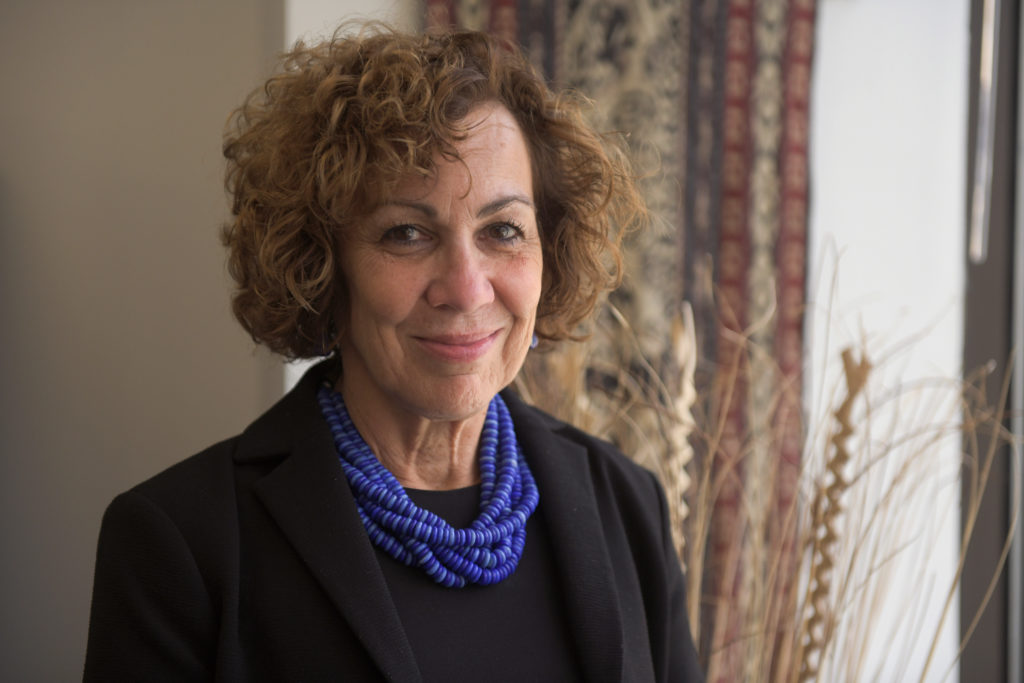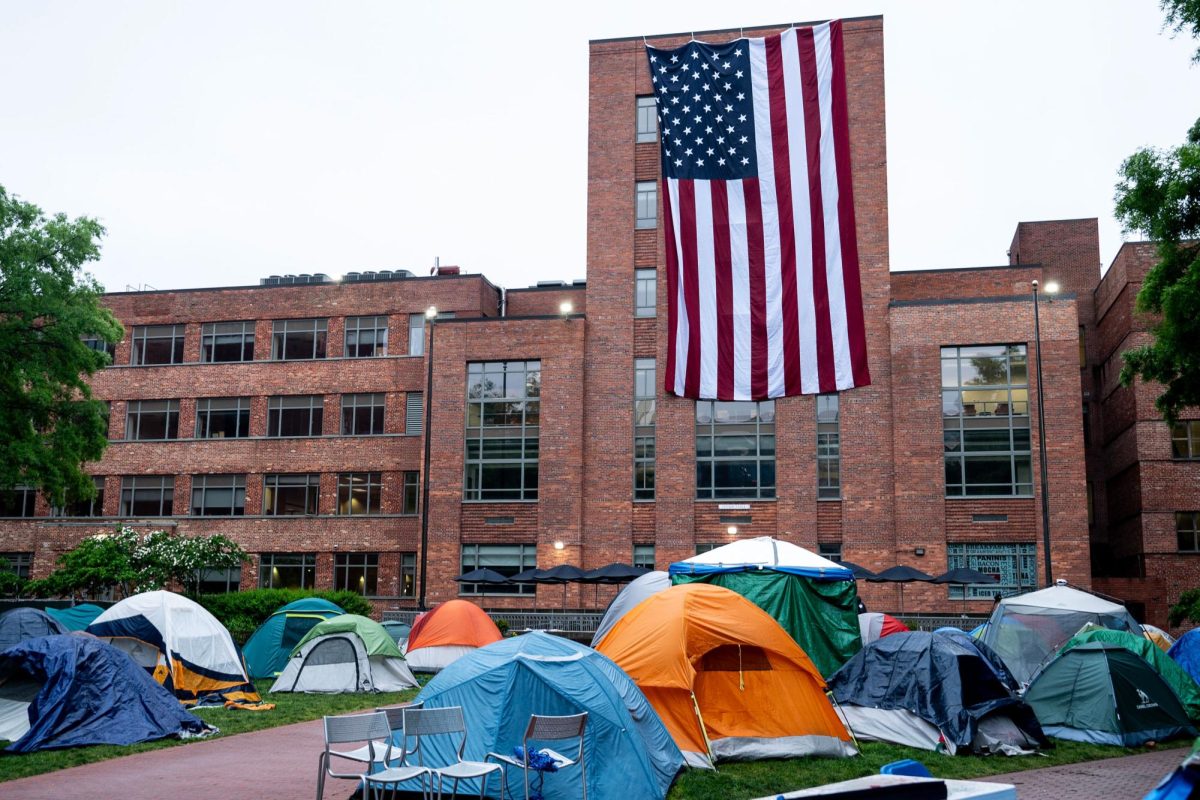After joining the University as the second dean in the nursing school’s relatively short 11-year history, Pamela Jeffries is stepping down and leaving behind a legacy of diversity, collaboration and research.
Jeffries, who served as dean for six years, said she accomplished her goals of leading the school into the top 25 ranked nursing schools in the nation, increasing its diversity, creating a doctoral program and more than doubling its student enrollment during her tenure. Pamela Slaven-Lee, the associate dean for academic affairs, will replace Jeffries after she leaves her current position in June and starts as dean of Vanderbilt University’s School of Nursing in July.
“It’s sad,” Jeffries said. “I love GW, and I’m dean emeritus for that. It’s sad for me to leave my colleagues, but I’m going to boundary span and we’ll collaborate and partner when we can.”
Jeffries assumed her position in 2015, five years after Jean Johnson, the school’s first dean, founded the school. University President Thomas LeBlanc thanked Jeffries for her tenure at the Board of Trustees meeting Friday.
“She has been a transformational leader for GW nursing, enhancing its teaching and research mission, the school’s programming and supporting students’ success,” LeBlanc said. “She’s been a wonderful colleague to all of those who have worked with her.”
Trustee Madeleine Jacobs, the chair of the Board’s academic affairs committee, said Jeffries has modeled “exemplary leadership” and has provided “extensive service” to the University.
“Jeffries has served GW with distinction since joining the University in 2015 as the second dean of the School of Nursing and as a tenured professor,” Jacobs said. “She has enhanced the school level criteria for excellence in research, teaching and service.”
As dean, Jeffries said she boosted enrollment from 500 students in 2015 to nearly 1,200 students today. She said this increase in students called for “aggressive hiring plans,” leading her to enlist more than 20 new faculty members during her time as dean.
Jeffries said she placed a strong emphasis on ensuring diversity with a “fair and equitable” hiring process. She said all faculty applicants had to submit a diversity, equity and inclusion statement before their interviews, and all professors went through implicit bias training.
She also appointed Sandra Davis, the school’s first assistant dean for diversity, equity and inclusion, three years ago and started an advisory council for diversity, equity and inclusion that issued a survey about the school’s climate to ensure it was inclusive for faculty and staff.
Jeffries said the nursing school received the Health Professions Higher Education Excellence in Diversity award in 2018, which recognizes health schools for its commitment to diversity and inclusion, from the largest diversity magazine in higher education, INSIGHT.
“Our values also reflect diversity, equity and inclusion, respect for all values, and we try to live by that,” Jeffries said.
Jeffries added that she implemented a PhD nursing program in 2018 after developing the school’s research base and adding more researchers, checking off another goal she had set for the school when assuming the position of dean in 2015.
Jeffries said she also focused on encouraging collaboration across the school to foster community with a “strength-based culture” in which all her faculty and staff completed Strengthfinders 2.0, a program that identifies an individual’s top five strengths.
“We all know each other’s top five strengths,” Jeffries said. “So we use our strengths when we operate all the time in our day to day occurrences, and when you use your strengths in the workplace, you are much more satisfied.”
Jeffries said she had “no intent” to leave the nursing school, but the position at Vanderbilt will allow her to be closer to her family in the Midwest while providing the opportunity to work at “a highly reputable school.”
Jeffries said she expects a “seamless” transition over to Slaven-Lee who has been her “right-hand person” as the associate dean for academic affairs and is fit to lead the nursing school forward.
“She’s been an academic leader as demonstrated by her senior academic dean role,” Jeffries said. “She’s got leadership skills. She’s got a great record with faculty, staff and students.”
Ashley Darcy-Mahoney, an associate professor of nursing, said Jeffries’ time as dean of the nursing school was “quite impressive” because she had the vision to grow research and innovation even when the school was so young at just 11 years old.
“Coming in as the second dean of a young school and sort of really having a vision of what to build and what GW School of Nursing could be, I think it takes a lot of foresight, a good bit of courage and a lot of strategy,” Darcy-Mahoney said.
Darcy-Mahoney said Jeffries’ emphasis on increasing annual research funding by nearly 160 percent strengthened her ability to do complete pediatric research within her field of expertise. She said Jeffries eliminated the “noise” around researchers and allowed them to focus strictly on the science, while staff were appointed to handle other aspects of research like budgeting and hiring.
Darcy-Mahoney added that the average age of nursing professors nationwide is 55 years old, but Jeffries hired younger faculty who specialized in diverse types of science like cancer and equity research.
Daisy Le, an assistant professor of health disparities and oncology, said Jeffries was committed to broadening the school focus from just nursing education to including health and equity. She said Jeffries hired people who didn’t necessarily have a clinical nursing background but could contribute knowledge to the field of health disparities.
Le said Jeffries supported all faculty, regardless of their background. She said she was “super sad” when she heard Jeffries would be leaving the nursing school.
“We are losing such a great leader in our school,” Le said. “She is such a go-getter. She cares about the people. That really shows in her leadership, and I think that has made a huge difference.”








